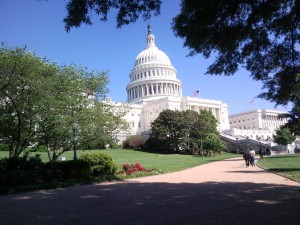 The battles that conservatives have waged in the Cultural War are grueling. We have to dispute every step of the way especially with a liberal political establishment and a vast socialistic bureaucracy. We also have to regenerate social institutions like family, community and faith against a hostile culture. There are no instant solutions in this struggle but just the blood, sweat and tears that are the characteristics of any conflict.
The battles that conservatives have waged in the Cultural War are grueling. We have to dispute every step of the way especially with a liberal political establishment and a vast socialistic bureaucracy. We also have to regenerate social institutions like family, community and faith against a hostile culture. There are no instant solutions in this struggle but just the blood, sweat and tears that are the characteristics of any conflict.
In the face of such difficulties, there is the temptation to think a shortcut might be possible. Perhaps we should forget all the grassroots bottom-up efforts that are so grueling. It would be much better to go for the jugular – simply get rid of big government, big education, big regulation, big everything. Once these monstrous structures are out of the way, everything big would instantly become small.
There is nothing wrong with making every legal effort to rid ourselves of the monstrous structures of big government especially those of bureaucratic rule and excessive regulation. However, this would only be a partial solution.
We need to remember that one reason (although not the only one) why big government became big in the first place was because the intermediary institutions of family, community and faith eroded and decayed. The government charged into the vacuum left behind and filled it with its programs and vast bureaucracies.
If we suddenly remove the monstrous structures of big government without any structures to replace them, everything will collapse on top of us and chaos will reign.
Small government doesn’t just happen. Smallness is not merely the absence of bigness. It involves rebuilding those small basic structures of society so eroded by our hostile culture. It requires an enormous effort—the same grueling effort, in fact, that we are presently employing in the Cultural War.
In an organic society, small government is only possible when family, community, voluntary associations and faith are strong. Big government needs to be rid of these intermediary bodies to stay big. Small government needs them more than ever to stay small.
Indeed, the small organic state does not brandish an immense power and authority like the modern state, but rather takes great joy in parceling out its sovereignty to these intermediary groups so that each might take care of its own. But this can only happen if there are vibrant groups to receive these parceled out powers.
Someone might object that we still have families, communities and churches that survive. Take the burden of big government off them, and everything will naturally fall into place without much grueling effort.
To this, we can reply that all these structures are but a shell of what they once were. True, they still manage to survive and would certainly benefit from the fall of big government. However, these surviving institutions alone are not enough to stem the tide of broken families, shattered communities and empty churches that blight our social landscape. The Detroitization of the nation is already far advanced. Our best defense against big government is a grueling moral regeneration of our social institutions.
Both efforts are necessary to bring about a return to order. However, by far the most important is the regeneration of our social institutions since small government can only stay small to the extent these flourish.
In my recent book, Return to Order: From a Frenzied Economy to an Organic Christian Society—Where We’ve Been, How We Got Here, and Where We Need to Go, I describe the historic process by which these associations have always served to keep small government small. These intermediary institutions are not mere counterparts of big government but have always been the very instruments by which big government was challenged and defeated.
It is no mystery why modern absolutist states wage a veritable war upon these associations. Hobbes and later Rousseau held that no social body should stand between the individual and the State. Napoleon went so far as to prohibit any association of over twenty persons. Communist regimes and socialist governments, past and present, do everything possible to destroy the family, community and faith.
Such actions recognize the fact that the individual alone is no match for big government’s powerful might. But when individuals gather together in social institutions, these associations are the natural means by which State power is curbed. They have always served as buffers between the individual and the State. They eliminate the need for the massive state, and reduce it to its proper and minimal role of the protector of the general order. They are also means by which a people can enjoy that rich social and culture life that makes life in society worth living.
Let us do everything possible to rid ourselves of big government, but let us, above all, secure the means to keep small government small.



